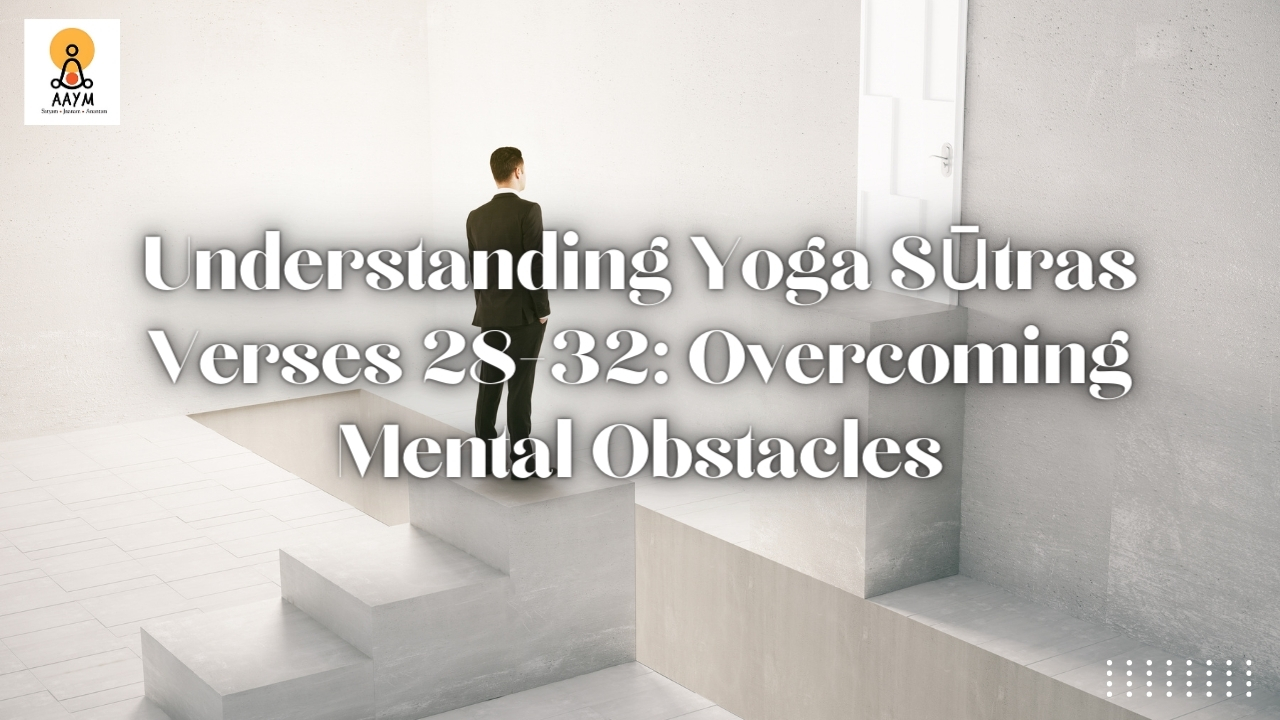Introduction
Explore critical verses from the Yoga Sūtras, which provide insights into the practice and philosophy of yoga. These verses teach us to overcome internal obstacles and deepen our meditation through discipline and focused repetition.
Yoga Sūtra Verse 28: The Power of Repetition
Sanskrit : Tajjapaḥ tadarthabhāvanam
Translation : That sound is repeated and murmured constantly to realize its meaning.
Interpretation : This verse highlights the practice of ‘Japa,’ or the repetition of a mantra, to deepen understanding and connection to its essence. Repeating a mantra not only aids in concentration but also fosters a profound internalization of its significance.
Yoga Sūtra Verse 29: Attaining Inner Awareness
Sanskrit : Tataḥ pratyakcetana adhigamaḥ api antarāya abhāvaḥ ca
Translation : As a result, there is the inwardness of the sense consciousness and the disappearance of obstacles to progress.
Interpretation : Following the disciplined practice of mantra repetition, the practitioner achieves an inward focus that enhances sensory awareness. This inward orientation helps overcome barriers that hinder spiritual and mental growth, facilitating a more straightforward path toward enlightenment.
Yoga Sūtra Verse 30: Identifying Obstacles to Progress
Sanskrit : Vyādhi styāna saṁśaya pramāda ālasya avirati bhrāntidarśana alabdhabhūmikatva anavasthitatvāni cittavikṣepaḥ te antarāyāḥ
Translation : These obstacles are disease, idleness, doubt, inattentiveness, lack of energy and proneness to sensuality, mistaken views, inability to maintain the progress attained, unsteadiness in progression, and scattered mental and emotional energy.
Interpretation : Patanjali lists several obstacles that impede progress in yoga. These include physical illness, mental lethargy, doubts, distractions, and sensory attachments, among others. Recognizing these hindrances is the first step towards overcoming them and advancing in one’s practice.
Yoga Sūtra Verse 31: Symptoms of a Distracted Mind
Sanskrit : Duḥkha daurmanasya aṅgamejayatva śvāsapraśvāsāḥ vikṣepa sahabhuvaḥ
Translation : Distress, depression, nervousness, and labored breathing are the symptoms of a distracted state of mind.
Interpretation : This verse describes the physical and emotional manifestations of a mind beset by distractions. Experiencing discomfort, emotional turmoil, restlessness, and irregular breathing are indicators that one’s focus is scattered and requires realignment.
Yoga Sūtra Verse 32: The Practice of Focused Reality
Sanskrit : Tatpratiṣedhārtham ekatattva abhyāsaḥ
Translation : To remove the obstacles, a standard method should be used in the pursuit of reality.
Interpretation : To counter the distractions detailed in previous verses, Patanjali advocates for consistent practice focused on a singular truth or principle. This methodical approach helps stabilize the mind and guides the practitioner toward spiritual clarity and progress.
These translations and interpretations strive to capture the essence of Patanjali’s teachings in a manner that is engaging and accessible while preserving the depth and meaning of the original text.
Explore critical verses from the Yoga Sūtras, which provide insights into the practice and philosophy of yoga. These verses teach us to overcome internal obstacles and deepen our meditation through discipline and focused repetition.
Yoga Sūtra Verse 28: The Power of Repetition
Sanskrit : Tajjapaḥ tadarthabhāvanam
Translation : That sound is repeated and murmured constantly to realize its meaning.
Interpretation : This verse highlights the practice of ‘Japa,’ or the repetition of a mantra, to deepen understanding and connection to its essence. Repeating a mantra not only aids in concentration but also fosters a profound internalization of its significance.
Yoga Sūtra Verse 29: Attaining Inner Awareness
Sanskrit : Tataḥ pratyakcetana adhigamaḥ api antarāya abhāvaḥ ca
Translation : As a result, there is the inwardness of the sense consciousness and the disappearance of obstacles to progress.
Interpretation : Following the disciplined practice of mantra repetition, the practitioner achieves an inward focus that enhances sensory awareness. This inward orientation helps overcome barriers that hinder spiritual and mental growth, facilitating a more straightforward path toward enlightenment.
Yoga Sūtra Verse 30: Identifying Obstacles to Progress
Sanskrit : Vyādhi styāna saṁśaya pramāda ālasya avirati bhrāntidarśana alabdhabhūmikatva anavasthitatvāni cittavikṣepaḥ te antarāyāḥ
Translation : These obstacles are disease, idleness, doubt, inattentiveness, lack of energy and proneness to sensuality, mistaken views, inability to maintain the progress attained, unsteadiness in progression, and scattered mental and emotional energy.
Interpretation : Patanjali lists several obstacles that impede progress in yoga. These include physical illness, mental lethargy, doubts, distractions, and sensory attachments, among others. Recognizing these hindrances is the first step towards overcoming them and advancing in one’s practice.
Yoga Sūtra Verse 31: Symptoms of a Distracted Mind
Sanskrit : Duḥkha daurmanasya aṅgamejayatva śvāsapraśvāsāḥ vikṣepa sahabhuvaḥ
Translation : Distress, depression, nervousness, and labored breathing are the symptoms of a distracted state of mind.
Interpretation : This verse describes the physical and emotional manifestations of a mind beset by distractions. Experiencing discomfort, emotional turmoil, restlessness, and irregular breathing are indicators that one’s focus is scattered and requires realignment.
Yoga Sūtra Verse 32: The Practice of Focused Reality
Sanskrit : Tatpratiṣedhārtham ekatattva abhyāsaḥ
Translation : To remove the obstacles, a standard method should be used in the pursuit of reality.
Interpretation : To counter the distractions detailed in previous verses, Patanjali advocates for consistent practice focused on a singular truth or principle. This methodical approach helps stabilize the mind and guides the practitioner toward spiritual clarity and progress.
These translations and interpretations strive to capture the essence of Patanjali’s teachings in a manner that is engaging and accessible while preserving the depth and meaning of the original text.

